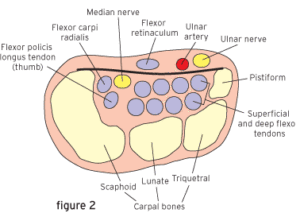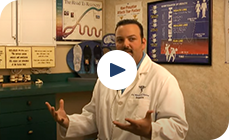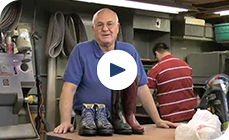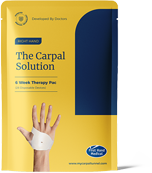What is Endoscopic Carpal Tunnel Surgery?
Endoscopic Surgery is a type of surgery that allows the Surgeon to make only two or three small incisions big enough to allow an endoscope and surgical tools on tubes to pass under the skin and through the tissue to the Transverse Carpal Ligament.


By The Carpal Solution Medical Team Over 300 years combined medical experience

Question:
“What is endoscopic carpal tunnel surgery and is it recommended over open carpal tunnel surgery?”
Brianne
Bellevue, Washington
Carpal Tunnel Answers by Doctors:
Thanks for your question Brianne!
Endoscopic Surgery is a type of surgery that allows the Surgeon to make only two or three small incisions big enough to allow an endoscope and surgical tools on tubes to pass under the skin and through the tissue to the Transverse Carpal Ligament. An endoscope is a specialized flexible tube with a camera and lighting on the end that allows the surgeon to see inside the body without making large incisions and without cutting through many layers of tissue.
The surgeon operates using a large monitor or screen to see what they are doing during using the camera the operation.
There are many potential advantages to endoscopic surgical procedures and also some potential disadvantages or additional risks to which the patient may be exposed.
 The advantage is that the endoscopic surgery is less invasive. This means that there is less collateral damage to body tissue that does not need to be cut to perform the surgical procedure. By only making a small incision, less muscle and other tissues are cut which makes the recovery and healing go faster post-surgery with fewer complications.
The advantage is that the endoscopic surgery is less invasive. This means that there is less collateral damage to body tissue that does not need to be cut to perform the surgical procedure. By only making a small incision, less muscle and other tissues are cut which makes the recovery and healing go faster post-surgery with fewer complications.
The disadvantage is that when working in such a small area remotely by camera where tendons, nerves muscles and ligaments are all very tightly packed into a small space, there is potential to nick a nerve or a tendon unintentionally with the scalpel when severing the Transverse Carpal Ligament.
The diagram to the left is enlarged for illustration purposes. The nerve and tendons are millimeters apart in reality. The Transverse Carpal Ligament is like a nylon rope that rests just over the nerve and the tendons. As shown here, the ligament is usually severed in the area just next to the Median Nerve to avoid the arteries, the tendons and the Ulnar Nerve on the other side. The Median Nerve and nine tendons are packed tightly in the Carpal Tunnel Space. So, the endoscopic surgery requires extreme precision and a lot of experience with the remote scalpel to avoid nicking the nerve and the tendons.
 Nerves are very sensitive by design. If the nerve is accidentally touched with the sharp scalpel then permanent nerve damage can easily result. In this case, symptoms of permanent nerve damage will likely be much worse after surgery than the symptoms of Carpal Tunnel Syndrome were before.
Nerves are very sensitive by design. If the nerve is accidentally touched with the sharp scalpel then permanent nerve damage can easily result. In this case, symptoms of permanent nerve damage will likely be much worse after surgery than the symptoms of Carpal Tunnel Syndrome were before.
A person can actually lose motor function and feeling sensation in the hand permanently when the nerve is nicked with the scalpel. There can also be numbness, tingling and intense shooting pain if the nerve is struck with the scalpel.
If a tendon is struck it is less serious, but it can be quite painful and affect the function of the tendon and the use of the particular finger it controls. Tendons do normally heal on their own and the damage to the tendon will eventually be repaired by your body’s healing process.
There is no right answer on which surgery is better. There are some Surgeons who refuse to do Endoscopic Carpal Tunnel Surgery, because of the proximity of the Nerve and the tendons to the ligament that must be severed. That alone tells you something about the risks.
Whenever you have surgery of any kind, it is a good idea to check the credentials of the Surgeon carefully as you choose who you will put your trust in to do the job. With Carpal Tunnel Surgery it would be the same. Pick an experienced surgeon with a great reputation amongst his patients.
 Better yet, it you would be best advised to avoid surgery altogether and try treating your Carpal Tunnel with a clinically documented natural stretching therapy that was developed by Doctors to help patients avoid the risks of Surgery. Look into the Carpal Solution Carpal Tunnel Treatment. You can try it without risks, without downtime and at minimal costs. It works for 97% of people and if it works for you, you can avoid the risks, downtime and expense of Carpal Tunnel Surgery of any type.
Better yet, it you would be best advised to avoid surgery altogether and try treating your Carpal Tunnel with a clinically documented natural stretching therapy that was developed by Doctors to help patients avoid the risks of Surgery. Look into the Carpal Solution Carpal Tunnel Treatment. You can try it without risks, without downtime and at minimal costs. It works for 97% of people and if it works for you, you can avoid the risks, downtime and expense of Carpal Tunnel Surgery of any type.
I hope that answers your questions. Thanks again for giving us the opportunity to help. I am confident it will help others who are wondering about this issue.
If you have more questions on Carpal Tunnel Surgery click here or look at the links under Carpal Tunnel Surgery in the menu bar at the top of this page.
Learn more about natural Carpal Tunnel Treatment by watching the videos on this page or perusing the website: MyCarpalTunnel.com

Order Your Six Week Carpal Tunnel Treatment Now
The ONLY treatment for carpal tunnel that comes with a no questions asked money-back guarantee and in-house dedicated pain relief team.
 Created by renowned Harvard health care professionals.
Created by renowned Harvard health care professionals. 









